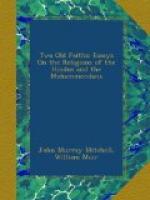[Sidenote: Contrast between divine and human work.] But even apart from these, the special blessings of Christianity, I ask, which now of the two faiths bears, in its birth and growth, the mark of a divine hand and which the human stamp? Which looks likest the handiwork of the God of nature, who “hath laid the measures of the earth,” and “hath stretched the line upon it,"[q] but not the less with an ever-varying adaptation to time and place? and which the artificial imitation?
[Sidenote: Islam.] “As a reformer, Mohammed did indeed advance his people to a certain point, but as a prophet he left them fixed immovably at that point for all time to come. As there can be no return, so neither can there be any progress. The tree is of artificial planting. Instead of containing within itself the germ of growth and adaptation to the various requirements of time, and clime, and circumstance, expanding with the genial sunshine and the rain from heaven, it remains the same forced and stunted thing as when first planted twelve centuries ago."[81]
[Sidenote: Christianity compared by Christ to the works of nature.] Such is Islam. Now what is Christianity? Listen to the prophetic words of the Founder himself, who compares it to the works of nature:
“So is the
kingdom of God, as if a man should cast seed into the
ground;
“And should
sleep, and rise night and day, and the seed should
spring and grow up,
he knoweth not how.
“For the earth
bringeth forth fruit of herself: first the blade,
then the ear, after
that the full corn in the ear."[r]
And again:
“Whereunto
shall we liken the kingdom of God, or with what
comparison shall we
compare it?
“It is like
a grain of mustard-seed, which, when it is sown in
the
earth, is less than
all seeds that be in the earth;




